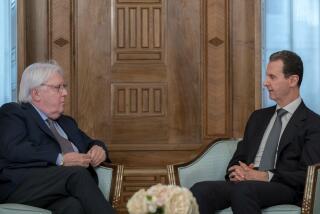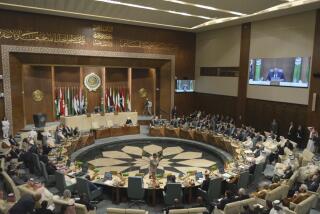Syria opposition’s divisions showing at Arab League meeting
- Share via
Reporting from Beirut — Deep fissures in the Syrian opposition were evident Wednesday when egg-throwing dissidents attempted to prevent other opposition figures from meeting with Arab League officials in Cairo.
Some activists reportedly chanted “Traitors!” as a delegation of Syrians attempted to enter the league headquarters.
The head of the visiting delegation, Hassan Abdel Azim, was eventually able to go inside and meet with the Arab League’s secretary-general, Nabil Elaraby, reported the pan-Arab satellite channel Al Jazeera.
The delegation to Cairo represented an opposition coalition known as the Syrian National Coordination Committee for Democratic Change.
A rival group, the Syrian National Council, formally established last month in Istanbul, Turkey, views the committee as a tool of President Bashar Assad. The committee denies being manipulated by the Syrian leader and says it is independent.
Both groups say they seek a democratic transition in Syria, where the Assad family has ruled in autocratic fashion for more than 40 years. Both say they support the protest movement that erupted in mid-March.
And both groups say they oppose foreign intervention in Syria, though the council has called for international monitors as a means of reducing violence against protesters.
But the two factions are divided on a key question: Is there still space for dialogue with Assad’s government?
The Syrian National Council says the only talks worth having are those predicated on his departure. Ausama Monajed, a council member speaking from London, said his group believes the Syrian president is seeking only the pretense of dialogue in a bid to extend his rule.
The rival committee has been more open to dialogue, but only after the government ends its crackdown on protesters.
Most experts agree that the opposition would be better off with the kind of united front that Libya’s Transitional National Council represented in the battle to topple Moammar Kadafi. The transitional council’s unity enabled it to garner international recognition and funding.
The Syrian National Council, with members both in and outside Syria, is a broad-based group modeled somewhat on the Libyan group. Libya’s transitional council rejected talks with Kadafi, the same position that the Syrian council has adopted with Assad.
But the still-fluid scenario in Syria is much different from what unfolded in Libya. The international community has rejected the kind of Western-led aerial bombing campaign that hastened Kadafi’s departure.
And core support for Assad within Syria may run deeper than anything that Kadafi could have counted on. By most accounts, Assad still has backing from various sectors, including business elites and minority populations anxious about potential sectarian bloodletting if he is toppled.
An Arab League peace plan, hammered out in Cairo last week, calls for Assad to withdraw security forces from populated areas and begin dialogue with dissenters. The opposition says Syrian security forces have killed more than 100 people since the pact was announced, raising questions about its viability.
The league is scheduled to meet Saturday in Cairo in a bid to revive the faltering peace pact. On the table will be calls from some dissidents that the league suspend Syria’s membership and impose sanctions.
In the meantime, opposition activists reported that security forces killed at least 26 more people Wednesday, including seven in the city of Homs and eight in the Barzeh neighborhood of Damascus, the capital. The deaths could not be independently verified.
The United Nations this week blamed Assad’s “brutal government crackdown” for the deaths of at least 3,500 people since protests began in March. Damascus blames armed “terrorists” for the unrest and says more than 1,000 security personnel have been killed.
More to Read
Sign up for Essential California
The most important California stories and recommendations in your inbox every morning.
You may occasionally receive promotional content from the Los Angeles Times.












